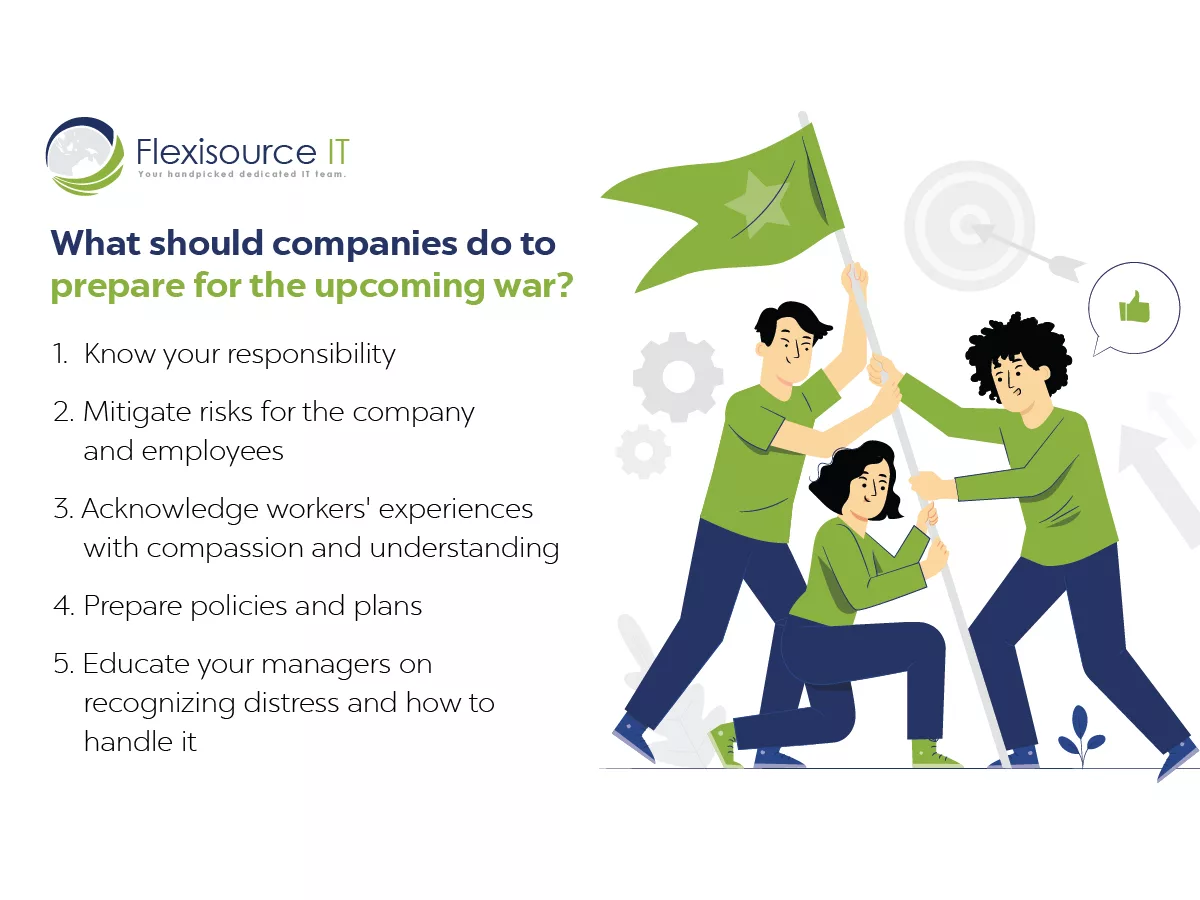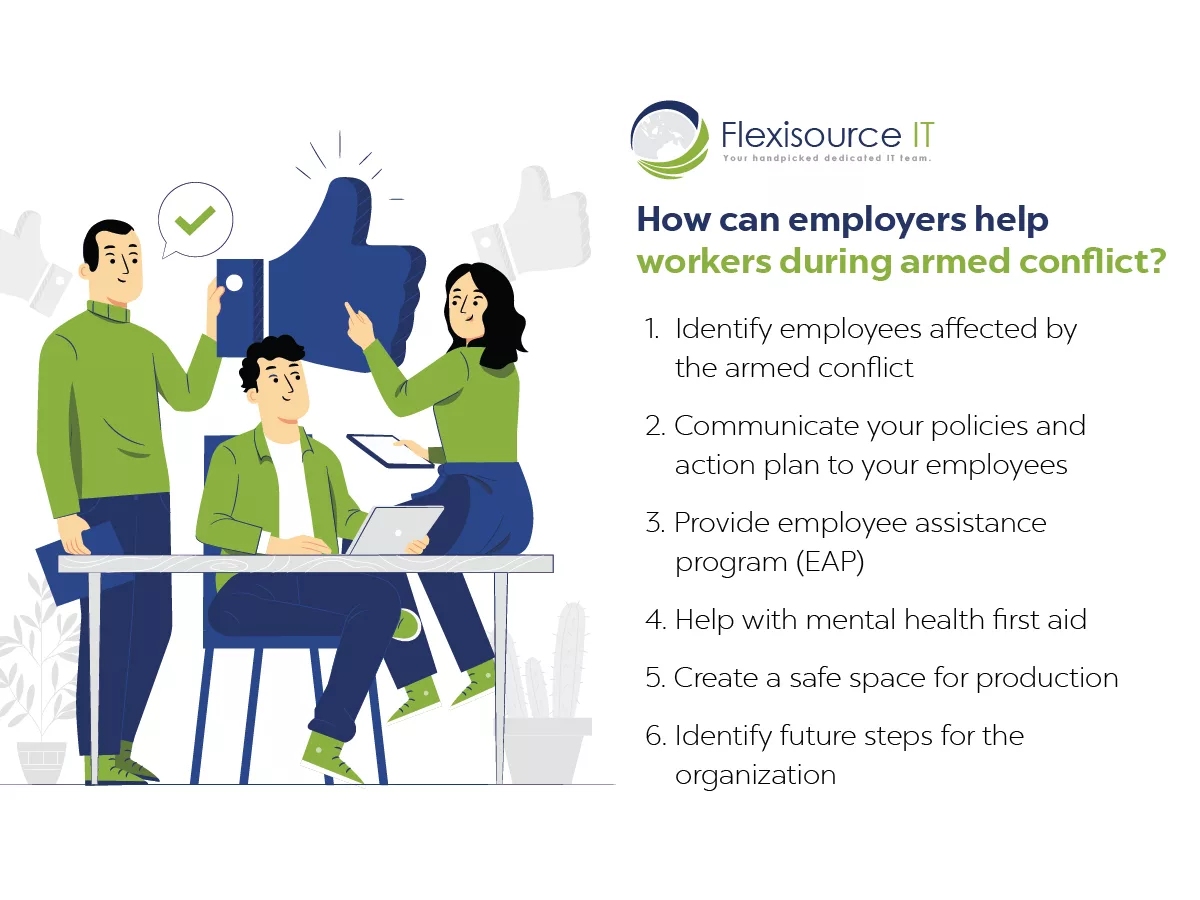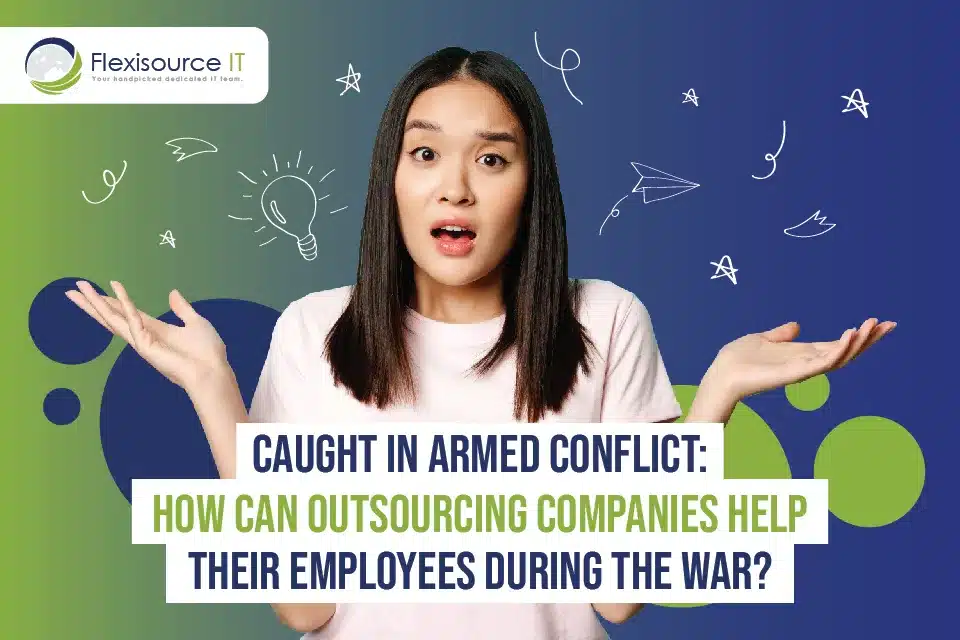Wars all over the world are a significant issue today. It has deeply worried a lot of people worldwide. Many felt great anxiety as they watched the event unfold and the situation deepens. And it is entirely understandable for companies to feel uncertain about their business and for employees to be scared for their safety. Without a proper plan of action or continuity plan, your organization might not survive the war.
Thus, employers need to carefully consider creating a plan to ensure the safety of their business. They need to help employees who are directly affected by the conflict and how to manage different situations.
This article will discuss how companies can prepare for an upcoming war and how they can help their employees during any conflict in the country.
What should Companies do to prepare for the upcoming war?

Regardless of people’s ability to cope, armed conflict can deplete human, social, and financial capacities. But with the proper grounding and tools, people and institutions can face and manage this instability better.
Traditional security and government humanitarian aid are usually not sufficient to help your employees to recover. Companies must harness new solutions between the employee and employer to create a proactive plan for their business and employees.
1. Know your obligations
Armed conflict often suspends business operations in areas affected. But what usually happens to their workers? It is generally unclear where an employer’s responsibilities fall during an armed conflict. There is not one set of standard operating procedures for a company to follow at times or during wars, and all duty bears to the government and international governmental organizations.
Some large companies take prompt action to evacuate their employees. In one case in Libya, the oil company BP moved its staff. It made its leased plane available to the UK government to help them marshal their resources back to the UK.
However, not all companies have this type of resource. Small to medium-sized organizations are powerless during armed conflict. In this case, the company needs to consult and inform the local government to take local nationals out of their country to evacuate.
2. Mitigate risks for the company and employees
Risks in an armed conflict are not the same for every company. It heavily depends on the industry and the size of the company. For example, startup companies are more likely not to be able to survive a war, unlike a large established company with resources.
Businesses need to assess and mitigate their risk to plan accordingly. Here are some factors a company needs to include when mitigating risks before the war:
- Offering employees time off when they need it
- Providing resources to help employees manage stress and anxiety, such as mental health days or counseling sessions
- Costs to keep employees and business alive
- Constraints in running the business
- Military reserved employees
3. Acknowledge workers’ experiences with compassion and understanding
Conflict leaves physical and mental scars on everyone, even your employees. You cannot stop your employees from being stressed about their own and family’s safety, not to mention their careers and source of income. Most employees’ morale would be low, and some may not do their jobs accordingly.
Likewise, employers need to acknowledge workers’ feelings and experiences. Employers should extend support to all employees. Companies should also prepare mental health guidance for their workers or partner with a therapist to help provide mental employee assistance.
4. Prepare Policies and Business Continuity Plan
The employer’s job is not to fight the war. Instead, they should prepare themselves for the war. Employers need to ensure that their employees are protected and do not get hurt at work. They also need to make sure that they know what legal rights they have in the workplace and how to enforce those rights if necessary.
Thus, it is wise for a company to prepare well-researched and well-thought plans that will reflect their actions and the safety of their employees during the war.
5. Educate your managers on recognizing distress.
Educating your company leaders is also essential employee assistance to your employees. Armed conflict is a very traumatic situation. As such, it’s important to educate managers on how to recognize distress and what to do when they notice it. It will help prevent any more conflict inside your company.
How can employers help workers during the war?
While companies must take action during the war, it is precious for companies to do something for their employees. The first step that they can take is to contact neutral agencies such as ICRC to help facilitate their evacuation and ensure the protection of everyone. Likewise, below are some steps on what an employer can do during a war.

1. Identify employees affected by the armed conflict
While most employees will be affected by armed conflict, learning the risks and hotspots of a dispute is essential. It is to know which employee you should help first or what your employee might experience during the conflict.
Companies should also conduct a stress test scenario where you create what-if scenarios and how your company and employees should respond to this. It can help your business and its workers are resilient during conflict and know you can continue your business.
2. Communicate your policies and action plan to your employees
The next step is for you to communicate your procedures and plan to employees. They need to be aware of your company’s strategy during an armed conflict. There is never a greater need for transparency than war. It is time for company leaders to be frank with their employees and board members about what they plan on during the war.
Don’t sugarcoat anything. Tell your employees the extent of your capability. Will you be helping them evacuate to another office? Are you going to provide employee assistance?
You will help them prepare for what your company will not cover and ensure their safety.
3. Provide an employee assistance program (EAP)
While employee assistance is not mandated, it could help your employees affected by the war. Companies can provide EAPs in cash, transportation, or government assistance coordination.
4. Help with mental health first aid
It can be hard to get through the day with all this violence. The toll is not only physical but also emotional. There have been reports of people being psychologically traumatized from the war. Hence, companies need to provide mental health first aid to people affected.
5. Create a safe space for production
The companies need to create a safe space during the war. Companies can be affected by conflict in the countries where they are operating. When there is an armed conflict, the companies need to take precautions and prepare for the worst to keep their business running smoothly.
6. Identify future steps for the organization.
During a downturn, the future is uncertain. There are several levers that a company needs to pull to continue the business running, such as conserving cash, earning profits, etc. Make sure to identify what to do next. Cut down anything that you don’t need. It may create a wrong perception among employees about the company’s state. However, it is necessary to keep the business running and save jobs.
Conclusion
Businesses at times of war can be sustainable as long as programs and policies are prepared and implemented. Focus on making your employees feel safe and more productive to continue your business working.
Furthermore, it would help if you watched the government’s next step related to your business, such as reforming business regulations, issuing tax breaks, evacuation plans, or partnerships with organizations.









